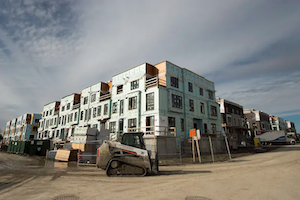Toronto housing report calls for billions in support from federal, provincial governments
A new report issued by City of Toronto staff calls for the city to approve the construction of 25,000 new, rent-controlled homes, bringing the city’s target to 65,000 units by 2030. To achieve this target, the report says the city will need tens of billions of dollars’ worth of financial support from the provincial and federal governments.

It describes how Toronto’s housing system could be strengthened with greater coordination among city divisions, agencies and corporations, as well as other orders of government and the not-for-profit, co-op and private sectors. The report also recommends an increased role for the city in the direct delivery of housing with staff to explore a city-led development model at five “housing ready” sites.
The actions in the report are focused on increasing the supply of non-market homes (those that are owned by the public, not-for-profit and co-op sectors), protecting existing rental homes and supporting renters. Key actions include:
- accelerating the development review and approval of new homes,
- working with the federal and provincial governments to increase access to funding and low-cost financing to move projects from approval into construction,
- establishing a more robust role for governments in both delivering and supporting the delivery of new homes, and
- developing new and sustainable funding models.
To address Toronto’s housing crisis, the report recommends 22 actions for the city, as well as the federal and provincial governments. They include:
- Dedicating more City-owned land to create new affordable homes and advancing due diligence on 40 additional city-owned sites that have been identified as potential future housing sites.
- Accelerating the delivery of “housing ready” projects on City and not-for-profit owned land including up to 17,500 net new affordable rental, rent-geared-to-income (RGI) and rent-controlled market homes on land owned by the city and almost 2,000 affordable and RGI homes on land owned by the not-for-profit sector.
- Streamlining and optimizing people, processes and technology to expedite approvals and housing delivery including adopting new and enhanced technology solutions to improve efficiencies and expedite the planning and building application review and approval processes.
- Developing new and sustainable funding models to expand the delivery of affordable and RGI homes within mixed-income and sustainable communities.
Since the launch of its HousingTO Plan, the city has committed approximately $8 billion in land, capital and operating funding and waived fees and charges. However, the deepening housing and homelessness crises require an even more robust range of actions across the housing continuum to adequately address the needs of current and future residents.
The city says it is committed to taking every possible action within its jurisdictional and financial capacity to address the housing crisis, but even those efforts will require support from the federal and provincial governments.
For example, of the overall 65,000 new rent-controlled homes target proposed in the report, funding has been secured to deliver 4,455 homes. The estimated cost to deliver the remaining 60,545 homes is between $28.6 billion and $31.5 billion across the next seven years. That funding gap requires contributions from all orders of government of between $500 million and $800 million per year, in addition to repayable financing.
Toronto is also pushing for a new fiscal deal to support the structural changes that will put the city on a path to long-term financial sustainability. For example, increased labour market capacity in the skilled trades and access to construction materials are needed to significantly scale up the production of new homes.
“We urgently need to build more affordable housing faster, so people in our city can find a home they can afford,” said Mayor Olivia Chow. “That’s why we’re leading a generational shift in both how we deliver housing and the type of housing we’re going to build. We’re coordinating all City divisions to pull in one direction – building housing faster – and we’re setting new priorities to build rent-geared-to-income and not-for-profit housing. This report lays out a housing roadmap and we invite the federal and provincial governments to join us. Working together, we can quickly deliver thousands of units of affordable housing over the next few years. We’re ready to build.”
The report will be considered by the city’s executive committee on October 31 and by the full city council between November 8 and 10.








